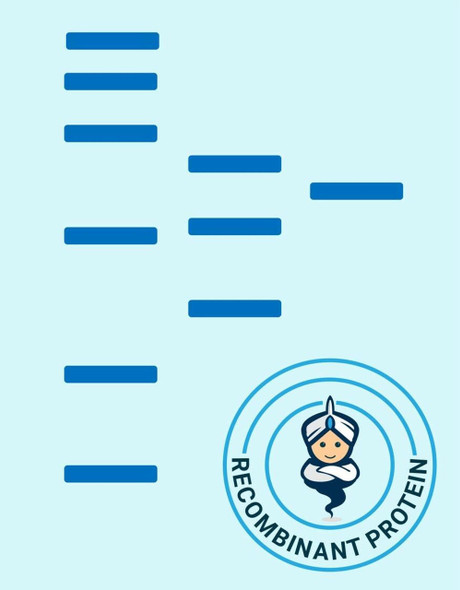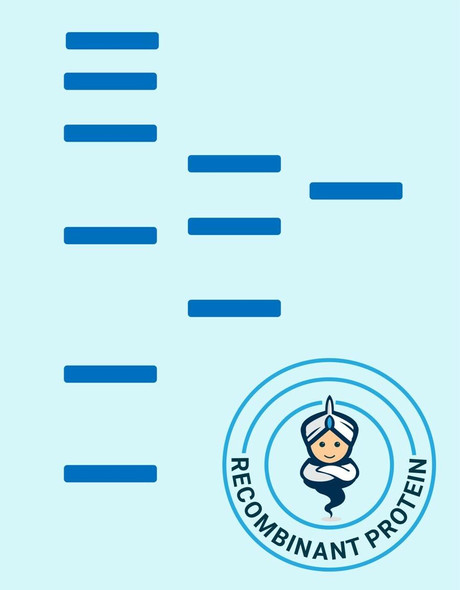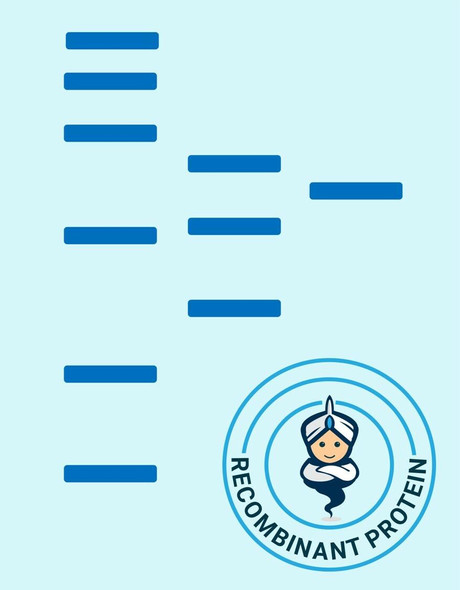Human EXOSC10 Recombinant Protein (RPPB3480)
- SKU:
- RPPB3480
- Product Type:
- Recombinant Protein
- Species:
- Human
- Uniprot:
- Q01780
Description
| Product Name: | Human EXOSC10 Recombinant Protein |
| Product Code: | RPPB3480 |
| Size: | 20µg |
| Species: | Human |
| Target: | EXOSC10 |
| Synonyms: | Exosome component 10, Polymyositis/scleroderma autoantigen 2, Autoantigen PM/Scl 2, Polymyositis/scleroderma autoantigen 100 kDa, PM/Scl-100, P100 polymyositis-scleroderma overlap syndrome-associated autoantigen, EXOSC10, PMSCL, PMSCL2, p2, p3, p4, RRP6, Rrp6p, PM-Scl. |
| Source: | Sf9 Insect cells |
| Physical Appearance: | Sterile Filtered clear solution. |
| Formulation: | EXOSC10 is supplied in 20mM HEPES, pH-7.5, 100mM NaCl, 0.01mM EDTA, 0.02% SDS. |
| Stability: | Store at 4°C if entire vial will be used within 2-4 weeks.�Store, frozen at -20°C for longer periods of time.Avoid multiple freeze-thaw cycles. |
| Purity: | Greater than 70% as determined by SDS-PAGE. |
EXOSC10 is a nucleolar protein and represents one crucial component of the so-called "PM/Scl complex" or "nuclear exosome", which is an RNA-processing complex consisting of a number of exoribonucleases (not to be confused with certain multivesicular bodies which are shed by cultured cells into the culture fluid and are also called exosomes).Autoantibodies against EXOSC10 occur in patients suffering from polymyositis, scleroderma or polymyositis/scleroderma overlap syndromes. While antibodies to other components of the exosome complex (PM/Scl 75, several Rrp proteins) can be found in some sera, practically all patients with autoantibodies against the PM/Scl complex are positive for EXOSC10 antibodies, making this specificity an important marker. The presence of EXOSC10 autoantibodies is a comparatively "good" prognostic sign in polymyositis/scleroderma overlap syndrome unlike the poor prognosis seen when other myositis and systemic sclerosis specific autoantibodies are present.
EXOSC10 Human Recombinant produced in SF9 is a glycosylated, polypeptide chain having a molecular mass of 102 kDa. EXOSC10 is expressed with a -6xHis tag and purified by proprietary chromatographic techniques.
| UniProt Protein Function: | EXOSC10: Putative catalytic component of the RNA exosome complex which has 3'->5' exoribonuclease activity and participates in a multitude of cellular RNA processing and degradation events. In the nucleus, the RNA exosome complex is involved in proper maturation of stable RNA species such as rRNA, snRNA and snoRNA, in the elimination of RNA processing by-products and non-coding 'pervasive' transcripts, such as antisense RNA species and promoter-upstream transcripts (PROMPTs), and of mRNAs with processing defects, thereby limiting or excluding their export to the cytoplasm. The RNA exosome may be involved in Ig class switch recombination (CSR) and/or Ig variable region somatic hypermutation (SHM) by targeting AICDA deamination activity to transcribed dsDNA substrates. In the cytoplasm, the RNA exosome complex is involved in general mRNA turnover and specifically degrades inherently unstable mRNAs containing AU-rich elements (AREs) within their 3' untranslated regions, and in RNA surveillance pathways, preventing translation of aberrant mRNAs. It seems to be involved in degradation of histone mRNA. EXOSC10 has 3'-5' exonuclease activity. EXOSC10 is required for nucleolar localization of C1D and probably mediates the association of SKIV2L2, C1D and MPP6 wth the RNA exosome involved in the maturation of 5.8S rRNA. 2 isoforms of the human protein are produced by alternative splicing. |
| UniProt Protein Details: | Protein type:Vesicle; Nucleolus; EC 3.1.13.- Chromosomal Location of Human Ortholog: 1p36.22 Cellular Component: nucleoplasm; membrane; cytoplasm; nucleolus; exosome (RNase complex); nucleus; nuclear exosome (RNase complex) Molecular Function:protein binding; exoribonuclease activity; nucleotide binding; 3'-5' exonuclease activity Biological Process: RNA processing; maturation of 5.8S rRNA; dosage compensation, by inactivation of X chromosome; mRNA catabolic process, nonsense-mediated decay |
| UniProt Code: | Q01780 |
| NCBI GenInfo Identifier: | 8928564 |
| NCBI Gene ID: | 5394 |
| NCBI Accession: | Q01780.2 |
| UniProt Secondary Accession: | Q01780,Q15158, B1AKQ0, B1AKQ1, |
| UniProt Related Accession: | Q01780 |
| Molecular Weight: | 885 |
| NCBI Full Name: | Exosome component 10 |
| NCBI Synonym Full Names: | exosome component 10 |
| NCBI Official Symbol: | EXOSC10�� |
| NCBI Official Synonym Symbols: | p2; p3; p4; RRP6; PMSCL; Rrp6p; PM-Scl; PMSCL2; PM/Scl-100�� |
| NCBI Protein Information: | exosome component 10; autoantigen PM-SCL; polymyositis/scleroderma autoantigen 2; polymyositis/scleroderma autoantigen 100 kDa; P100 polymyositis-scleroderma overlap syndrome-associated autoantigen |
| UniProt Protein Name: | Exosome component 10 |
| UniProt Synonym Protein Names: | Autoantigen PM/Scl 2; P100 polymyositis-scleroderma overlap syndrome-associated autoantigen; Polymyositis/scleroderma autoantigen 100 kDa; PM/Scl-100; Polymyositis/scleroderma autoantigen 2 |
| Protein Family: | Exosome component |
| UniProt Gene Name: | EXOSC10�� |
| UniProt Entry Name: | EXOSX_HUMAN |










